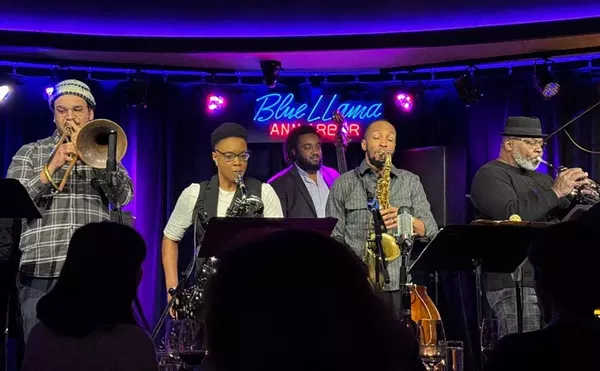Singing is Sheila Landis’ passion and jazz is her religion. It’s been a long time since the jazz community has heard a vocalist who embodies such poetic lyricism, one who uses her voice to entice and enliven.
Landis approaches the music as if she’s a horn player and she hasn’t pigeonholed herself by just playing one style. In fact, she moves through the old tunes with the grace and sophistication of Anita O’Day. Her interpretation of the blues is rich with emotionalism and history, and she has become an expert "scat-ologist."
At a time when female jazz vocalists are blazing a new trail, Landis has been in the trenches perfecting a sound suffused with honesty and a soft romanticism. Her accompaniment ranges from a straight-ahead trio to a large Brazilian ensemble. But she’s at her best when she’s backed by the soulful strumming of guitarist Rick Matle, whom she has worked with for more than 15 years.
At times, Landis’ music has a healing and sustaining force. She transforms herself when he sings, her voice becoming an instrument and her body language an extension of the song. She wraps herself around a ballad with such warmth that it would bring tears to Billie Holiday’s eyes. Then she can run through a Fats Waller composition such as "Ain’t Misbehavin’" without losing any of her honesty and magnetism.
Jazz enthusiasts praise her for being able to play different facets of the music, but the praise hasn’t given her the "diva complex." Whether she’s performing for a small audience at a café or swinging at a large jazz festival, Landis remains the embodiment of grit and sophistication. –Charles L. Latimer
Saxophonist and clarinetist Wendell Harrison plays big, lives big and produces big results. On his instruments, he stomps and swings. Describing his music as bebop meets free jazz, he’s the kind of jazz musician who does things on a large scale.
For example, he has single-handedly rescued the clarinet from extinction and has restored it to respectability. Not since soloists such as Pee Wee Russell and Barney Bigard has a clarinetist blown such new life into this instrument. In 1989, Harrison organized the Clarinet Ensemble, which achieved international acclaim. The goal for the ensemble was to reintroduce the clarinet as a major jazz instrument.
Early in his career, Harrison demonstrated that he was destined to turn the jazz world inside out. With the likes of Charles McPherson, Donald Walden and Phil Lasley, he helped to put Detroit on the map as a city that produced not only luxury automobiles but also gifted saxophone players.
Over the years, Harrison has become one of Detroit’s cultural treasures. In 1993, he was named Arts Midwest Jazz Master, a title which he takes seriously. He’s a clever improviser who’s always looking for new ways to speak on his instrument. As the owner of WenHa Music, he produces his own albums and makes certain that his musical destiny rests in his own hands.
And although Harrison likes to experiment with different forms of jazz, he remains dedicated to his bebop roots. It doesn’t matter if he’s playing one of his obscure free jazz arrangements or one of Duke Ellington’s compositions, Harrison always puts some fragment of bebop in it. –Charles L. Latimer
Larry Nozero and Lyman Woodard
They hardly began with the same reference points.
Saxophonist Larry Nozero recalls how as a kid he heard Benny Goodman and then an Art Pepper record, "and that was it, I never turned back."
Hammond B-3 man Lyman Woodward talks about being rocked ‘n’ rolled by Chuck Berry and Little Richard, and New Orleans R&B titans such as Fats Domino and Huey "Piano" Smith. Jazz came later, but even then, once Woodard decided that jazz was his future, organ player Jimmy Smith reset Woodard’s musical compass and he was groovin’ on the funky edge of jazz.
Still, it’s odd that Nozero and Woodard have never had a real gig together, despite crossing paths on the Detroit jazz scene since the ‘60s.
"I can’t tell you how many times Lyman and I will be standing somewhere and one of us will say, ‘You know, one day we oughta do something together,’" Nozero recalled the other day.
They were having the conversation for the umpteenth time at last year’s Montreux Detroit Jazz Festival, says Woodard, when then-festival honcho Jim Dulzo overheard them and salted the idea away for this year’s Frog Island fest, which he also guides.
What’ll this be like?
"I bring Lyman my way a little and he brings me his way," said Nozero.
Those "ways" might be summed up by dubbing them Mr. Funky and Mr. Cool. Nozero’s recent Warm record features his quartet with strings and he’s followed it with live gigs in the same format.
Woodard may have downshifted into semiretirement of late, but his musical credo is still – to recycle one of his virtual theme songs – "Don’t Stop the Groove." Rather than gigs, he’s concentrating on his Corridor Records label, with releases by his group, his guitarist Rob Tye and (upcoming) hard-bopping saxophonist Steve Wood.
And who knows what’s ahead for Woodard and Nozero. Both say that if this works, Mr. Funky and Mr. Cool could be more than a one-shot after all these years. –W. Kim Heron






